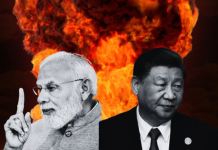As Jammu and Kashmir officially became two Union Territories (UTs) the political disempowerment of the state on tenterhooks has come a full circle after 70 years.
Can ARAB NATO – The Middle East Strategic Alliance (MESA) Counter Iran?
On October 27, 1947, Maharaja Hari Singh bargained a special status for this region within the Union of India which gave New Delhi control over the region’s defence, communication and foreign affairs alone.
Experts on the region state – “That day in 1947 marked the beginning of disempowerment of Jammu and Kashmir and its people. Since then it has been the history of betrayals and loss of power.”
The political disempowerment started with the arrest of the state’s first Prime Minister, Sheikh Mohammad Abdullah, in what is known widely as the “Kashmir conspiracy case”. Abdullah was kept in detention for 13 long years.
A year after Abdullah’s arrest, New Delhi issued the 1954 Presidential Order that gave powers to the government at the Centre to extend provisions in the Indian constitution on matters other than the three agreed-upon subjects, to Jammu and Kashmir.
More BJP-Led States To Weed-Out Illegal Immigrants Via ‘Contentious’ Citizenship Policy
Since then, more than 45 Constitutional Application Orders have been issued by the government allowing New Delhi to extend laws and constitutional provisions to J&K, in violation of its state’s special position. The latest was the order that scrapped Article 370 and paved the way for the state’s bifurcation into two Union Territories (UT) of J&K and Ladakh under Jammu and Kashmir Reorganisation Act, 2019.
However, things took a cruel turn in 1965, the then state government amended the J&K constitution and took away the positions of Sadr-e-Riyasat (president) and prime minister in J&K. The prime minister was demoted to the post of chief minister and the Sadr-e-Riyasat was replaced by the governor, as chosen by the Central Government.
The subsequent Indira-Sheikh accord and Rajiv-Farooq accord paved the way for the surrender of more powers to the Centre.”
“The successive state regimes were used to undermine the autonomy of the state as the state government’s consent was a must to recommend the extension of provisions of the constitution of India to J&K through Presidential Orders. A substantial part of J&K’s autonomy was taken away by 1975 and it was brought down to the level of other states.”
British Labour Party Hardens Stance On Kashmir; Could Apologize For Jallianwala Bagh Massacre
According to experts, during the past 70 years, J&K had lost its ability to develop compared to other states in India but the only area where it enjoyed supremacy over other states was in the continuation of Article 35A of the Constitution.
The act allowed the J&K legislature empowered to make laws describing the state subjects. The provision protected the citizenship, jobs and ownership of the property while keeping them exclusively for permanent residents of Jammu and Kashmir. With Article 370 gone and Article 35A abolished automatically, which has led to fears about the “design” under which the government of India is operating to change the demography of Kashmir.
Constitutional expert A.G. Noorani observes that the special status of J&K in the constitution of India was “reduced to a husk; unconstitutionally and immorally.”
How Apple Trade Took A Hit In The Kashmir Valley After The Revocation Of Article 370?
Another political analyst looking at the locals as prisoners of war mentions “They were all demanding more autonomy for the state and even some of them were backing the restoration of pre-1953 position.”
“But the government of India has humiliated them all. In other places, we have seen the transition and up-gradation of a UT to the state level but in the case of J&K, not only was its special position taken away, but its statehood has also been snatched as well.”
Under the J&K Reorganisation Act, the state of Jammu and Kashmir is demoted to two UTs. While the Ladakh UT will function without an assembly, J&K will have a legislature. J&K’s legislature has been reduced from bi-cameral to uni-cameral, described by many as the last nail in the coffin.
In the new scheme of things, J&K’s assembly lost its powers to enact laws on police and public orders, which fall in the state list under the Indian constitution.
Trump Offers To Mediate On Kashmir Dispute and Repair India and Pakistan Relations
Under the UT, the J&K chief minister and his cabinet’s position are namesake. The Lt. Governor will have the powers to decide. The elected regime will have no powers even in matters related to promotion and transfers of officers of the All India Services like IAS, IPS and IFS. All the powers will be exercised by the Centre through its selected Lt. Governor.
From June 2018, the ACB, under the LT. Governor has raided and served notices to several mainstream politicians and businessman in a drive which many see as the Centre’s tactic to pressurise the mainstream camp to maintain silence over Article 370.
Islamic Heritage Could be Wiped Out From India – Pakistan Warns The UN
A senior bureaucrat stated “The LG’s would be the most powerful institution in J&K UT while the chief minister will be like his advisor. He can’t even have a say in the appointment of his principal secretary.” In the UT, the size of the J&K council of ministers has been trimmed to nine from 24, which makes the position of political parties more awkward.




